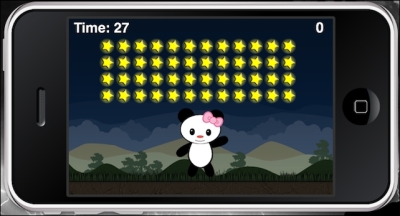Right now, we need to set the offscreen position for the panda and have it transition to its starting launch location, so the user can interact with it.
- After adding the variables, create a new local function called
startNewRound()and add anifstatement to initiate thepandaobject into the scene:local startNewRound = function() if panda then
- Add a new local function called
activateRound()withinstartNewRound(). Set the starting position of thepandadisplay object on screen and addground:toFront(), so that the ground appears in front of the panda character:local activateRound = function() waitingForNewRound = false if restartTimer then timer.cancel( restartTimer ) end ground:toFront() panda.x = 240 panda.y = 300 panda.rotation = 0 panda.isVisible = true - Create another local function called
pandaLoaded(). SetgameIsActivetotrueand set thepandaobject's air and hit properties tofalse. Addpanda:toFront()so that it appears in front of all the other game objects on screen and set the body type to"static":local pandaLoaded = function() gameIsActive = true panda.inAir = false panda.isHit = false panda:toFront() panda.bodyType = "static" end - Transition the panda to
y=225in 1,000 milliseconds. When the tween is completed, call thepandaLoaded()function using theonCompletecommand. Close theactivateRound()function withendand call out to it. Close theifstatement forpandaand thestartNewRound()function withend:transition.to( panda, { time=1000, y=225, onComplete=pandaLoaded } ) end activateRound() end end
When the level is activated, the panda is placed below the ground before it is visible to the player. For pandaLoaded(), the game is activated by gameIsActive = true, and the panda is ready for launch by the player. The panda transitions from the ground level to an area on the screen where it can be accessed.